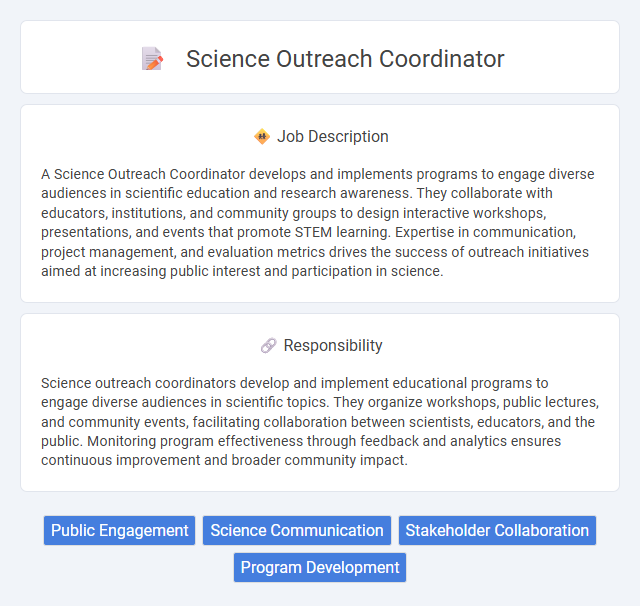
A Science Outreach Coordinator develops and implements programs to engage diverse audiences in scientific education and research awareness. They collaborate with educators, institutions, and community groups to design interactive workshops, presentations, and events that promote STEM learning. Expertise in communication, project management, and evaluation metrics drives the success of outreach initiatives aimed at increasing public interest and participation in science.
Individuals who are passionate about science communication and possess strong organizational skills will likely find the role of a Science Outreach Coordinator suitable for their abilities. Those who enjoy engaging diverse audiences and have a talent for coordinating events or educational programs may thrive in this position. People with a preference for collaboration and adaptability will probably be well-suited to meet the evolving demands of outreach initiatives.
Qualification
A Science Outreach Coordinator requires a strong foundation in scientific disciplines, typically evidenced by a bachelor's or master's degree in biology, chemistry, environmental science, or a related field. Proven experience in project management, public engagement, and communication skills is essential to effectively design and implement educational programs that bridge scientific knowledge to diverse audiences. Proficiency in digital tools for content creation and a deep understanding of community engagement strategies enhance the ability to foster meaningful connections and promote science literacy.
Responsibility
Science outreach coordinators develop and implement educational programs to engage diverse audiences in scientific topics. They organize workshops, public lectures, and community events, facilitating collaboration between scientists, educators, and the public. Monitoring program effectiveness through feedback and analytics ensures continuous improvement and broader community impact.
Benefit
Science outreach coordinators likely enhance public understanding of scientific concepts by designing accessible educational programs. They probably facilitate community engagement, increasing interest in STEM fields and fostering collaboration between researchers and the public. This role often benefits organizations by expanding their reach and promoting scientific literacy.
Challenge
Science outreach coordinators likely face the challenge of effectively communicating complex scientific concepts to diverse audiences with varying levels of understanding. They may need to balance the demands of limited resources and time while ensuring engagement and accessibility. Overcoming these hurdles probably requires innovative strategies and strong interpersonal skills.
Career Advancement
Science outreach coordinators develop and implement programs to engage the public and educational institutions with scientific research and discoveries. Career advancement in this role often leads to senior positions such as outreach director, public relations manager, or science communication specialist, where strategic planning and leadership skills are essential. Mastery in program management, grant writing, and stakeholder engagement significantly enhances promotion prospects within academic, non-profit, and governmental organizations.
Key Terms
Public Engagement
A Science Outreach Coordinator specializing in Public Engagement develops and implements strategic programs to connect scientific research with diverse audiences, enhancing community understanding and participation. They collaborate with educational institutions, museums, and media to create interactive exhibits, workshops, and digital content that make complex scientific concepts accessible and engaging. Measuring impact through surveys and feedback tools ensures continuous improvement in public science literacy and fosters lasting relationships between researchers and the community.
Science Communication
A Science Outreach Coordinator specializes in translating complex scientific concepts into accessible content for diverse audiences, enhancing public understanding and engagement. They design and implement strategic programs using multimedia platforms, workshops, and community events to foster science literacy. Expertise in science communication, audience analysis, and educational program development is essential for maximizing outreach impact.
Stakeholder Collaboration
A Science Outreach Coordinator facilitates effective stakeholder collaboration by engaging universities, research institutions, community organizations, and funding agencies to promote scientific literacy and participation. They design tailored communication strategies and partnership frameworks that align with diverse stakeholder goals, ensuring mutual benefits and sustained engagement. Expertise in project management, negotiation, and cross-sector communication is critical to harmonizing objectives and maximizing outreach impact.
Program Development
Science outreach coordinators specialize in program development by designing and implementing educational initiatives that engage diverse audiences in scientific learning. They collaborate with researchers, educators, and community partners to create hands-on activities, workshops, and events tailored to promote STEM literacy. Their role includes assessing program impact and adapting content to meet evolving educational standards and outreach goals.
 kuljobs.com
kuljobs.com